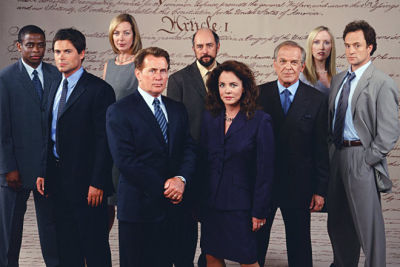One of my favorite shows of all time is the West Wing. I can’t believe it has been off the air for eight years now. President Bartlet and his team of advisors epitomized a group of hard-working, civic minded leaders that showed the best of politics and our government. The drama, the comedy, and the characters always interested me. I would still rather watch a rerun of the West Wing than just about any other show on television today.

There are also many lessons that we can learn from the West Wing besides how to walk and talk in the hallway. I’ve outlined five leadership lessons that I believe we can take away from the West Wing.
1. Don’t be afraid to ask for help.
This is my favorite scene of the entire show. President Bartlet is cooking Thanksgiving stuffing, but he is worried that if he doesn’t cook it long enough he may make his guests sick. If only there was a 1-800 number that you could call and get advice for cooking Thanksgiving dinner. Enter the Butterball hotline.
Even a Nobel Prize winning President of the United States can’t be an expert in everything. How many times do we try to be the expert instead of asking someone more knowledgeable for help? How much headache could we save by asking for help from a source with more information. Next time you run into a question or a problem, ask for instructions or advice.
2. Listen to those who don’t always have the chance to be heard.
Always a fan favorite, Big Block of Cheese Day was the one day when people that might not normally get the ear of White House staffers got a chance to petition their government – no matter how crazy the idea. As Leo’s speech details, Andrew Jackson had a big block of cheese brought into the White House for his inauguration. He then threw open the doors for anyone to attend.
As a leader, it is important to listen to everyone’s voice. Major donors, community partners, government officials, and student government leaders have access to provide their views and requests. There are many less powerful constituencies that rarely have a chance to be heard. In the spirit of Big Block of Cheese Day, take an opportunity to hear from someone that you wouldn’t ordinarily have a chance to interact with or engage on the major issues facing your department. You may find this discussion more useful than those that typically have the opportunity to provide feedback.
3. Develop key advisors to help you make decisions.
During each State of the Union Address, one member of the presidential line of succession does not attend to make sure there is someone to lead the country in the event of a horrible tragedy. In this episode, President Bartlet meets with the designee and gives some poignant advice. Name your best friend as your new Chief of Staff.
All leaders need great advice and counsel. I can’t overstate the significance of close trusted advisors. Develop relationships where someone will tell you the truth when you need to hear it. The best advice I get are from trusted friends and colleagues who are able to tell me exactly what I need to hear even if I don’t want to hear it.
4. Know when to compromise and know when to stand on principle.
On the eve of the government’s budget expiring, President Bartlet’s staff and Congressional leaders agree to a compromise to keep the government operating while they continue negotiating on a long-term budget deal. At the last minute, the upstart Speaker of the House changes the agreement. President Bartlet isn’t willing to play games and breaks off negotiations which results in a government shutdown.
There are times when we need to compromise. Some issues have many viewpoints that should be respected or areas where compromise between parties is best for everyone involved. Yet, there are times when a leader has to stand on principle. One of the great challenges of leadership in higher education or any area is being able to tell the difference between the two.
5. It is okay to make a mistake, but learn from it.
Much of the drama and even humor of the West Wing focused on mistakes made by President Bartlet or his staff. In one of the funnier exchanges in the show, Deputy Chief of Staff Josh Lyman gets onto a web site and engages with his “fans.” This is one of many times when Josh says something he shouldn’t or gets into trouble. Each time a member of the staff makes a mistake, they face the consequences, try to learn from it, and attempt not to make it again.
Whether running the country or leading a unit on campus, any leader that makes decisions will inevitably make mistakes. We all do it. The important thing is to learn from the mistake and improve going forward. There is no way to eliminate mistakes and failure is often a key component of success. However, it is important that we take the time to consider the cause of the error and work to do better in the future.
Question: Who was your favorite character on the show and what lessons did you learn from their mistakes? I’d love to hear your thoughts in the comment section below. You can leave a comment by clicking here.


Please note: I reserve the right to delete comments that are offensive or off-topic.